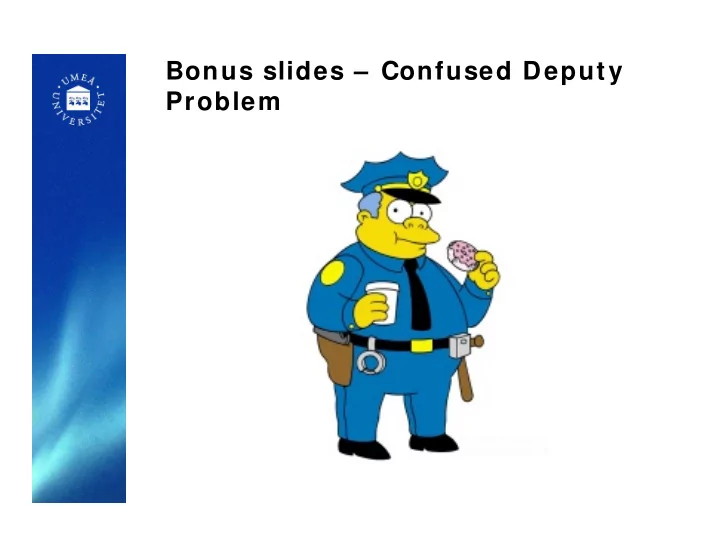

Bonus slides – Confused Deputy Problem
Original exam ple Norm al output file Request: 1. Do action 2. Write results to “Im portant server file” Client Server Response: OK Im portant server file
Original exam ple ( 2 ) • Possible if the server executes the command using its own credentials, similarly to a traditional buffer overflow • Used as a prime argument for having capabilities • First appeared in 1988 • Many other attacks can be seen as confused deputy attacks – One example is circumventing a firewall by running traffic through a browser
Cross-site Request Forgery • CDP using a Web browser Web site URL Disguised as <im age> e.g: http:/ / m ail.com / changepw?newpw=hack Login Change PW Resolve Client
CSRF • Cookies and active sessions to other sites can be exploited to execute commands on the client by remote code • Somewhat situational – Requires active session or cookie between the user and the target site – Requires a suitable target command at the target site – The referer header can be checked to avoid this exploit (but this is not always done) – Hidden fields with tokens can be used to avoid this • JavaScript can be used to read information from other open tags • Script languages can be used to send POST
Login CSRF • Cause the victim to log in at a remote site using the attackers credentials • Technically easier that normal CSRF • Opportunities for novel attacks
Cross-site Scripting • 80% of all documented vulnerabilities as of 2007 (according to Wikipedia) • XSS has evolved into meaning injecting e.g. HTML and JavaScript into Web pages • Usually used to steal session cookies • Live example…
XSS • Three types: – Non-persistent: What we just did. – Persistent: Online message boards etc. • Executed more than once – DOM-based: Targeting already existing scripting elements that parse parameters and generate content • Similar to Non-persistent, but can also be used to bypass e.g. client sandboxes • One known weakness was local Firefox error pages
Recommend
More recommend
Stay informed with curated content and fresh updates.